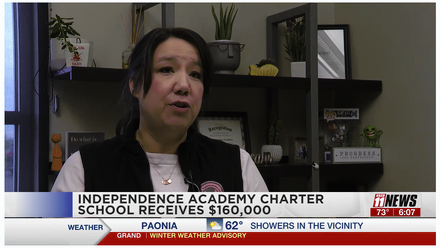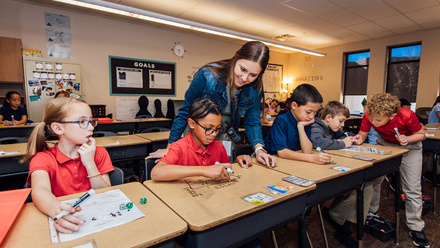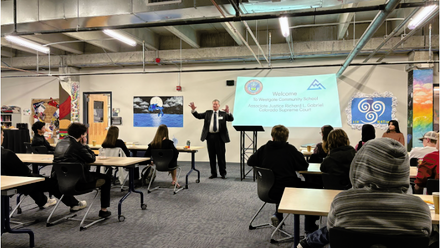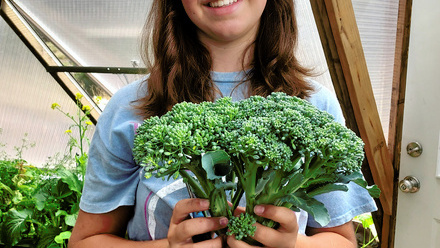The Power of “Yes”: How a Unique Partnership Nourishes Steamboat Montessori
For rural charter schools, providing consistent and nutritious meals to students can be a significant hurdle. Limited resources and infrastructure often stand in the way. However, Steamboat Montessori, a CSI-authorized, K-5 school in Northwest Colorado, has found an innovative solution with a unique partnership. After joining the National School Lunch Program (NSLP) one year ago, they teamed up with the neighboring South Routt School District (SRSD) to provide hot meals to their students. Their partnership highlights the role of community and creativity in addressing food security in rural charter schools.
A Mission to Nourish and Nurture
Steamboat Montessori's foray into the NSLP began with a fundamental commitment to student well-being. Head of School Emily Barnhart explains that initially, the charter school joined to “ensure that every child, regardless of their family’s income, has consistent access to a nutritious, balanced meal during the school day. We recognized that hunger and food insecurity can be major barriers to focus, learning, and well-being."
Since implementing free meal services, however, the school has yielded remarkable results that exceeded expectations. “We've realized that this was about more than income," Barnhart says.
The overwhelming student participation rate, jumping from an anticipated 35% to an average of 85-90%, underscores the relief this program has offered families. Parents have expressed that it provides them with the "gift of time," while reducing a daily burden. Moreover, the program has “promoted equity across classrooms, and contributed to calmer afternoons, improved focus, and better overall energy in our students,” says Barnhart.
A Unique Partnership takes Shape
When others said ‘no,’ Lloyd (Dewey) Whitecotton said, ‘yes.” As acting Food Service Director at SRSD, his motivation to engage was rooted in the simple desire to help.
“It seemed like we could do it and all the kitchen staff agreed,” says Whitecotton. While there was a slight increase in funding for the district, it wasn't the primary driver. SRSD saw an opportunity to provide "hot fresh meals," a significant improvement from sack lunches. Plus, the additional workload of preparing around 80 meals daily was manageable within their existing operations, says Whitecotton.
For their part, Steamboat Montessori had to establish a basic kitchen infrastructure — including cooler, freezer, serving line and warmers —plus navigate inspections and training. Billing and compensating SRSD staff for the additional workload also presented an early hurdle.
Despite these initial logistical considerations, Whitecotton affirms that the partnership is "going better than expected," attributing it to "good people on both ends." That includes a local resident, Lori Livingston, who donated a box truck to support the project’s launch. Though it ultimately proved too large, the school was able to sell it, combining the proceeds with donations from the Yampa Valley Community Foundation and the Craig Scheckman Family Foundation to purchase a new Chevrolet Suburban.
With it, Steamboat Montessori handles ninety-nine percent of the lunch transportation, while SRSD absorbs the food service portion, and provides critical support, including alternative meal options in case of unforeseen delivery disruptions like winter weather.
A Stepping Stone to Autonomy
This unique partnership is a critical stepping stone to Steamboat Montessori's ultimate vision: fully autonomous in-house food service. It’s a goal that will allow the school to align meals more closely with their Montessori values, explains Barnhart — emphasizing fresh, whole ingredients, minimal waste, and student participation. It would also offer flexibility in tailoring menus to dietary needs and family preferences.
However, the path to autonomy presents additional challenges, including acquiring necessary kitchen infrastructure, hiring qualified staff, and navigating the complexities of food procurement and USDA regulations. Funding also remains the most significant hurdle. To bridge this gap, the school plans to embrace phased planning, grants and local partnerships.
Explains Barnhart, “Our long-term goal is to create a sustainable model that reflects both our educational philosophy and our commitment to student health.”
Securing Support: A Multi-Pronged Approach
Steamboat Montessori's success in securing both grants and a partnership with a district outside of its own, highlights effective strategies for fundraising and community engagement in a rural setting. Barnhart attributes the school’s success to five key strategies:
-
Clearly communicating the "why" behind their efforts — connecting food access to learning, equity, and wellness
-
Leveraging authentic stories and data from their school community to demonstrate impact
-
Building relationships with local organizations and foundations who share their values
-
Staying transparent and consistent with their messaging across platforms
-
Prioritizing stewardship — thanking donors personally, showing results, and continuing the conversation beyond the initial gift
Grants included the Gates Family Foundation’s Rural Charter School Food Pilot Grant and the Colorado Trust Grant, both led by the Colorado League of Charter Schools to increase access to school meals at twelve rural charter schools.
Looking Ahead: Cultivating Growth
Steamboat Montessori continues to refine its food program and move in the direction of autonomy, with composting efforts underway as well as plans to enhance the lunchroom space. This commitment to continuous improvement, coupled with the SRSD partnership and ongoing fundraising, is driving their success.
What began as a simple introduction to SRSD has grown into a meaningful partnership grounded in shared values and mutual support. “Our partnership with South Routt has been an unexpected and deeply rewarding gift,” shares Barnhart. “From the moment we connected, it was clear we shared a common mission: to nourish and support our students by ensuring every child is well-fed.”
Steamboat Montessori is one of twelve charter schools participating in the League's Rural School Food Project (RSFP). Funded by a grant from The Colorado Trust, the project strives to increase access to nutritious and affordable food at rural charter schools across the western slope and northern Colorado. Read more about the project here.






